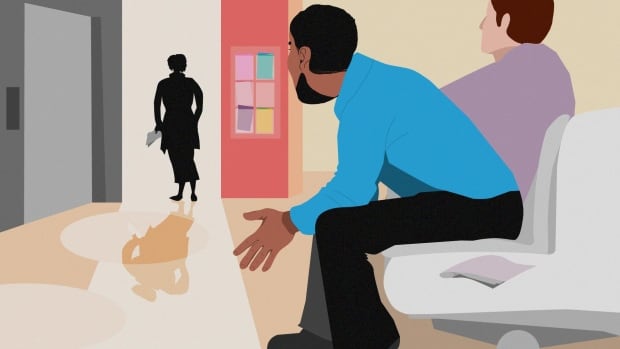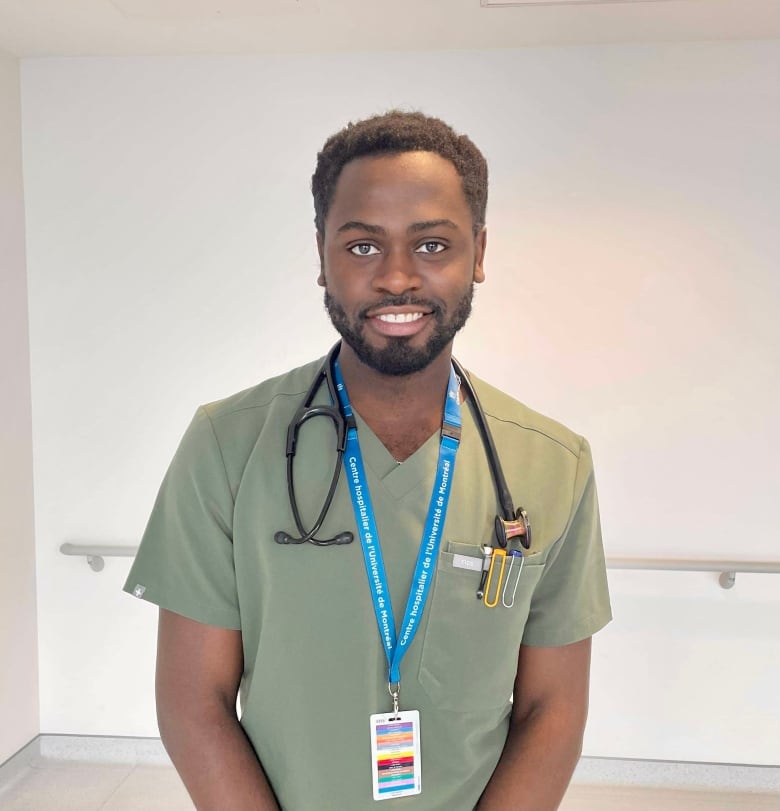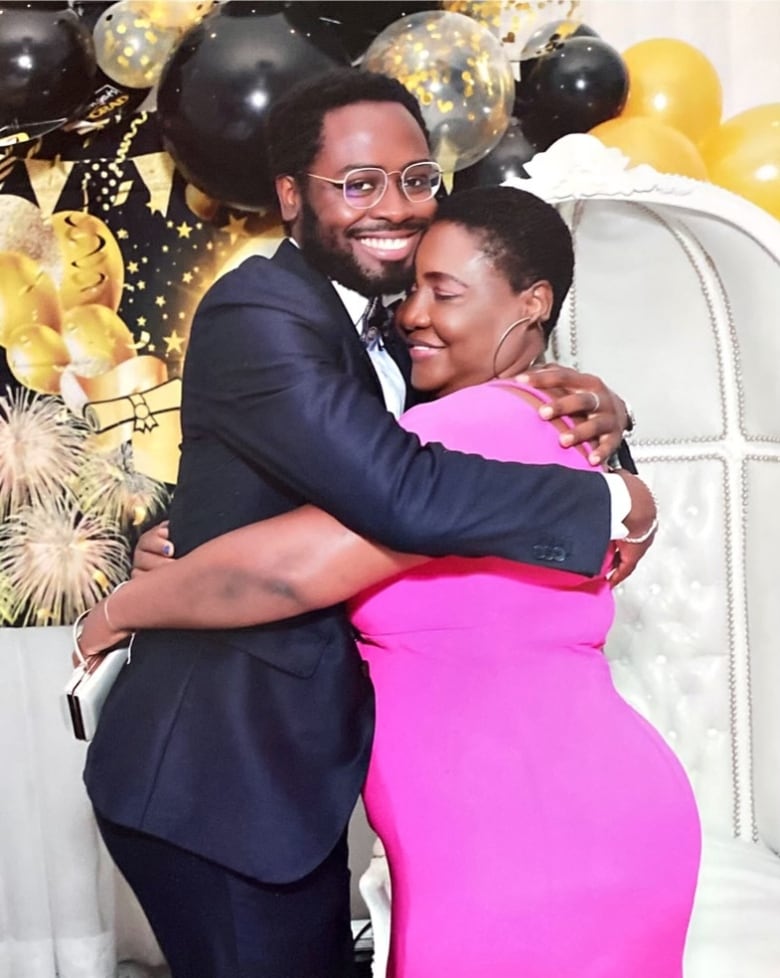
This Opinion piece is by Dr. Wolf Thyma, a first-year psychiatry resident at Université de Montréal. For more information about CBC’s Opinion section, please see the FAQ.
Born in Haiti, I immigrated to Canada at the age of seven. Proud of my modest origins, I always tell anyone who will listen that my parents led me to study law and medicine while they worked for minimum wage in factories in Montréal-Nord.
But I didn’t meet a Black doctor until I was 22 years old — a week before I was to begin medical school. When a Black woman picked me up in the waiting room of a medical clinic in downtown Montreal, I first assumed she was the secretary.
It was a moment when time seemed to stand still. A multitude of emotions followed one after the other; the ecstasy of meeting a doctor with the same skin colour as mine turned into sadness. That sadness came from the thought: how can you expect a Black child to dream and believe they can be a doctor without ever seeing a person who looks like them in that role?
With the support from my parents, I was about to pursue a career in medicine, but until then, I had never perceived a Black person as a doctor. It’s become clear to me that some others still find it unbelievable.
Even now, six years later and a first-year psychiatry resident, I’ve lost count of how many times employees or patients have assumed that I was an orderly or housekeeping attendant.
Importance of diverse medical professionals
Of the 300 students in my medical class at the Université de Montréal last year, there were three Black people. I was the only Black man. Because I already felt like an imposter due to my skin colour and low socio-economic background, being an average medical student wasn’t an option. I refused to let anyone believe that Black students were lesser.
Being one of the few representatives of my community in medicine comes with the weight of having to excel at all costs.

In 2021, Black students at the Université de Montréal represented just 1.5 to 3 per cent of those studying medicine. However, Black Montrealers between the ages of 15 and 24 represented 8.3 per cent of the city’s population, according to census data in 2016.
As for medical students in Canada, a 2020 study published in the Canadian Medical Education Journal found that of the 1,388 people surveyed, only 1.7 per cent identified as Black, while census data showed Black people represented 6.4 per cent of Canada’s population.
This made me wonder: What importance, if any, does diversity have in the medical field?
Several studies have demonstrated how important it is for the people working in the medical profession to reflect the populations they serve.
A 2018 study published in the Academic Medicine journal found that medical school graduates from underrepresented minority groups were more inclined to work with underserved populations than their white and other racialized counterparts.
Studies also suggest visible minorities prefer being cared for by doctors who are ethnically similar to them. In a study of more than 100,000 participants, researchers from the University of Pennsylvania found that racialized people are more satisfied with care when it’s provided by physicians with the same racial or ethnic background as them.

Many of my own patients have expressed how happy they are about being treated by a doctor who looks like them. Some have even cried.
Especially in cases of mental health, where cultural stigma can be a struggle for many youth, particularly the Black, Indigenous and people of colour (BIPOC) community, my perspective as a Black man is helpful on a daily basis.
My own research
In recent years, the diversity of medical students appears to have become a concern for some medical education institutions in Canada. In its 2020 report, the Association of Faculties of Medicine of Canada recommended that the recruitment of students who reflect the population served should be a priority for faculties of medicine.
Wanting to understand how exactly Canadian medical schools are working to include more people from traditionally underrepresented groups in medicine, I started a research project with two professors of psychiatry from Université de Montréal.
Our initial findings show that equity, diversity, and inclusion initiatives can be grouped into three main categories: before, during, and after admission.
We found most initiatives focus on during admission — a process where we observed faculties have the most control and where they can achieve the fastest results.
Take the University of Toronto’s Faculty of Medicine, for example. In 2017, it created the first Black Student Application Program in the country. Three years later, the largest cohort of Black medical students in Canadian history was accepted into the faculty’s class of 2024 — a national record of 24 new students. A year before the program was created, the faculty had just one Black medical student in a cohort of 256.
Several universities across the country now offer these types of pathway programs to medical school applicants, according to our research. The programs primarily target Black and Indigenous people and aim to address certain barriers they may face during the admissions process.
For example, in my medical interviews six years ago, I was judged solely through the lens of white evaluators.
Now, these pathways often require that candidates’ applications be reviewed by evaluators with the same ethnocultural backgrounds as them. The same applies for interviewers.
Some faculties have also begun investing in before admission initiatives, such as outreach-type programs that meet with people from marginalized communities years before they are eligible to apply to medical school.
Medical community remains conservative
Despite this progress, the medical community remains extremely conservative. Pathway programs for underrepresented communities are still scarce, and other various measures to promote diversity are often not unanimously supported.
There’s also the prevailing myth of medical meritocracy — the idea that only the best and brightest should be admitted to medical school.
Let’s Go14:15Are we on track to boosting Black representation in Quebec’s healthcare system?
Black representation seems to be on the rise in our universities. Specifically in McGill’s faculty of medicine: it’s reporting a 400% increase in Black medical students. That’s going from five Black medical students last year, to 24 students this year. So what do Black medical students think? We hear from first-year medical student at McGill, Hendrick Paquette Ambroise, and first-year psychiatry resident at UdeM, Wolf Thyma.
This meritocratic system, which presumes to be neutral, presupposes that everyone starts from the same point of origin in society — ignoring the impacts of colonialism and the weight of socio-economic factors on social mobility, which primarily leave racialized people at a disadvantage.
This traditional system in Canadian medical schools has contributed to ongoing inequities by excluding certain groups of candidates for over a century.
If we hope to one day have Canadian doctors that reflect the country’s diverse populations, medical schools across the country must embrace the significant difference between equality and equity.
For more stories about the experiences of Black Canadians — from anti-Black racism to success stories within the Black community — check out Being Black in Canada, a CBC project Black Canadians can be proud of. You can read more stories here.


